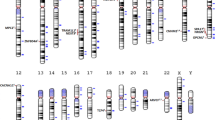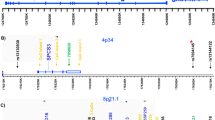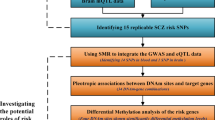Abstract
Recently, the nested genes G72 and G30 on chromosome 13q32–q33 have been implicated in the etiology of schizophrenia. We genotyped six single-nucleotide polymorphisms (SNPs: rs3916965, rs3916967, rs2391191, rs778294, rs779293 and rs3918342), which span approximately 82.5 kb in the region encompassing the G72/G30 genes in 1176 Han Chinese subjects (588 cases and 588 controls) and 365 Scottish subjects (183 cases and 182 controls). Significant association between an allele of marker rs778293 and schizophrenia was found in our Chinese samples (P=0.0013), and was replicated in the Scottish samples (P=0.022). LD analysis revealed that four SNPs between rs3916965 and rs778294 were in LD, called block I, and the two distal SNPs (rs778293 and rs3918342) constituted a block II in both the Chinese and Scottish samples. We selected one SNP from each block (rs778294 from block I and rs778293 from block II), and then analyzed the haplotypes. A significant difference was observed for the common haplotype GC in the Chinese sample (P=0.0145), and was replicated in the Scottish sample (P=0.003). On meta-analysis, we separately analyzed the studies in Asian and European populations because of significant heterogeneity in the homogeneity test. We found a statistically significant association between rs778293 and schizophrenia in Asian populations, but no difference was found between cases and controls in the European populations. Overall, our data give further support to the existing evidence that G72/G30 genes are involved in conferring susceptibility to schizophrenia.
This is a preview of subscription content, access via your institution
Access options
Subscribe to this journal
Receive 12 print issues and online access
$259.00 per year
only $21.58 per issue
Buy this article
- Purchase on Springer Link
- Instant access to full article PDF
Prices may be subject to local taxes which are calculated during checkout
Similar content being viewed by others
References
Zhou M, Zhuang YL, Xu Q, Li YD, Shen Y . VSD: a database for schizophrenia candidate genes focusing on variations. Hum Mutat 2004; 23: 1–7.
Owen MJ, Williams NM, O’Donovan MC . The molecular genetics of schizophrenia: new findings promise new insights. Mol Psychiatry 2004; 9: 14–27.
Christian SL, McDonough J, Liu CY, Shaikh S, Vlamakis V, Badner JA et al. An evaluation of the assembly of an approximately 15-Mb region on human chromosome 13q32–q33 linked to bipolar disorder and schizophrenia. Genomics 2002; 79: 635–658.
Blouin JL, Dombroski BA, Nath SK, Lasseter VK, Wolyniec PS, Nestadt G et al. Schizophrenia susceptibility loci on chromosomes 13q32 and 8p21. Nat Genet 1998; 20: 70–73.
Lin MW, Sham P, Hwu HG, Collier D, Murray R, Powell JF . Suggestive evidence for linkage of schizophrenia to markers on chromosome 13 in Caucasian but not Oriental populations. Hum Genet 1997; 99: 417–420.
Brzustowicz LM, Honer WG, Chow EWC, Little D, Hogan J, Hodgkinson K et al. Linkage of familial schizophrenia to chromosome 13q32. Am J Hum Genet 1999; 65: 1096–1103.
Shaw SH, Kelly M, Smith AB, Shields G, Hopkins PJ, Loftus J et al. A genome-wide search for schizophrenia susceptibility genes. Am J Med Genet 1998; 81: 364–376.
Levinson DF, Holmans PH, Straub RE, Owen MJ, Wildenauer DB, Gejman PV et al. Multicenter linkage study of schizophrenia candidate regions on chromosomes 5q, 6q, 10p, and 13q: schizophrenia linkage collaborative group III. Am J Hum Genet 2000; 67: 652–663.
Chumakov I, Blumenfeld M, Guerassimenko O, Cavarec L, Palicio M, Abderrahim H et al. Genetic and physiological data implicating the new human gene G72 and the gene for D-amino acid oxidase in schizophrenia. Proc Natl Acad Sci USA 2002; 99: 13675–13680.
Tsai G, Coyle JT . Glutamatergic mechanisms in schizophrenia. Annu Rev Pharmacol Toxicol 2002; 42: 165–179.
Schumacher J, Abon Jamra R, Freudenberg J, Becker T, Ohlraun S, Otte ACJ et al. Examination of G72 and D-amino-acid oxidase as genetic risk factors for schizophrenia and bipolar affective disorder. Mol Psychiatry 2004; 9: 203–207.
Wang XY, He G, Gu NF, Yang JD, Tang JX, Chen Q et al. Association of G72/G30 with schizophrenia in the Chinese population. Biochem Biophys Res Commun 2004; 319: 1281–1286.
Korostishevsky M, Kaganovich M, Cholostoy A, Ashkenazi M, Ratner Y, Dahary D et al. Is the G72/G30 locus associated with schizophrenia? Single nucleotide polymorphisms, haplotypes, and gene expression analysis. Biol Pshchiatry 2004; 56: 169–176.
Addington AM, Gornick M, Sporn AL, Gogtay N, Greenstein D, Lenane M et al. Polymorphisms in the 13q33.2 gene G72/G30 are associated with childhood-onset schizophrenia and psychosis not otherwise specified. Biol Pshchiatry 2004; 55: 976–980.
Zou FG, Li C, Duan SW, Zheng YL, Gu NF, Feng GY et al. A family-based study of association between the G72/G30 genes and schizophrenia in the Chinese population. Schizophr Res 2005; 73: 257–261.
Mulle JG, McDonough JA, Chowdari KV, Nimgaonkar V, Chakravarti A . No evidence for association to the G72/G30 locus in an independent sample of schizophrenia families. Mol Psychiatry 2005; 10: 433–434.
Hattori E, Liu CY, Badner JA, Bonner TI, Christian SL, Maheshwari M et al. Polymorphisms at the G72/G30 gene locus, on 13q33, are associated with bipolar disorder in two independent pedigree series. Am J Hum Genet 2003; 72: 1131–1140.
Chen YS, Akula N, Detera-Wadleigh SD, Schulze TG, Thomas J, Potash JB et al. Findings in an independent sample support an association between bipolar affective disorder and the G72/G30 locus on chromosome 13q33. Mol Psychiatry 2004; 9: 87–92.
He L, Li T, Melville C, Li S, Feng GY, Gu NF et al. 102T/C polymorphism of serotonin receptor type 2A gene is not associated with schizophrenia in either Chinese or British population. Am J Med Genet 1999; 88: 95–98.
Greenwood TA, Alexander M, Keck PE, McElroy S, Sadovnick AD, Remick RA et al. Evidence for linkage disequilibrium between the dopamine transporter and bipolar disorder. Am J Med Genet 2001; 105: 145–151.
Germer S, Holland MJ, Higuchi R . High-throughput SNP allele-frequency determination in pooled DNA samples by kinetic PCR. Genome Res 2000; 10: 258–266.
Ye S, Dhillon S, Ke X, Collins AR, Day IN . An efficient procedure for genotyping single nucleotide polymorphisms. Nucleic Acids Res 2001; 29: E88.
Sham PC, Curtis D . Monte Carlo tests for associations between disease and alleles at highly polymorphic loci. Ann hum Genet 1995; 59: 97–105.
Zhao JH, Curtis D, Sham PC . Model-free analysis and permutation test for allelic associations. Hum Hered 2000; 50: 133–139.
Srephens M, Smith NJ, Donnelly P . A new statistical method for haplotype reconstruction from population data. Am J Hum Genet 2001; 68: 978–989.
Song Y, Niu T, Manson JE, Kwiatkowski DJ, Liu S . Are variants in the CAPN10 gene related to risk of type 2 diabetes? A quantitative assessment of population and family-based association studies. Am J Hum Genet 2004; 74: 208–222.
Korostishevsky M, Kremer I, Kaganovich M, Cholostoy A, Murad I, Muhaheed M et al. Transmission disequilibrum and haplotype anlyses of the G72/G30 locus: suggestive linkage to schizophrenia in Palestinian Arabs living in the North of Israel. Am J Med Genet, Published Online: 4 Aug 2005.
Dunham A, Matthews LH, Burton J, Ashurst JL, Howe KL, Ashcroft KJ et al. The DNA sequence and analysis of human chromosome 13. Nature 2004; 428: 522–528.
Glatt SJ, Wang RS, Yeh YC, Tsuang MT, Faraone SV . Five NOTCH4 polymorphisms show weak evidence for association with schizophrenia: evidence from meta-analyses. Schizophr Res 2005; 73: 281–290.
Glatt SJ, Faraone SV, Tsuang MT . Association between a functional catechol O-methyltransferase gene polymorphism and schizophrenia: meta-analysis of case–control and family-based studies. Am J Psychiatry 2003; 160: 469–476.
Mitchell AA, Cutler DJ, Chakravarti A . Undetected genotyping errors cause apparent overtransmission of common alleles in the transmission/disequilibrium test. Am J Hum Genet 2003; 72: 598–610.
Leal SM . Detection of genotyping errors and pseudo-SNPs via deviations from Hardy–Weinberg equilibrium. Genet Epidemiol 2005; 29: 204–214.
Acknowledgements
We are deeply grateful to all the families who participated in this study, as well as to the psychiatrists and mental health workers who helped us with the identification of the families. This work was supported by grants from the Ministry of Education, PRC, the national 973 and 863 Projects, the National Natural Science Foundation of China and the Shanghai Municipal Commission for Science and Technology.
Author information
Authors and Affiliations
Corresponding author
Rights and permissions
About this article
Cite this article
Ma, J., Qin, W., Wang, X. et al. Further evidence for the association between G72/G30 genes and schizophrenia in two ethnically distinct populations. Mol Psychiatry 11, 479–487 (2006). https://doi.org/10.1038/sj.mp.4001788
Received:
Revised:
Accepted:
Published:
Issue Date:
DOI: https://doi.org/10.1038/sj.mp.4001788
Keywords
This article is cited by
-
Association Analysis Between the rs1899663 Polymorphism of HOTAIR and Risk of Psychiatric Conditions in an Iranian Population
Journal of Molecular Neuroscience (2020)
-
pLG72 levels increase in early phase of Alzheimer’s disease but decrease in late phase
Scientific Reports (2019)
-
Association of PDE4B polymorphisms and schizophrenia in Northwestern Han Chinese
Human Genetics (2012)
-
Population-based and family-based association studies of ZNF804A locus and schizophrenia
Molecular Psychiatry (2011)
-
Relationships between COL2A1 gene polymorphisms and knee osteoarthritis in Han Chinese women
Molecular Biology Reports (2011)



